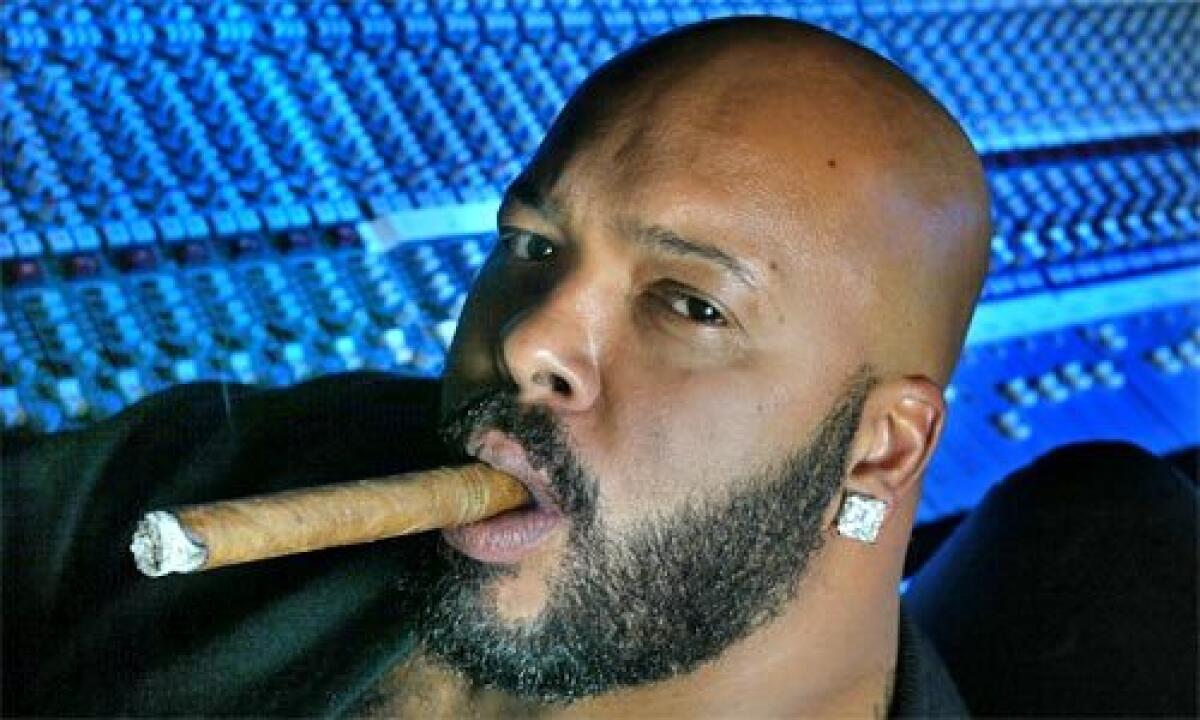Knight’s probation revoked by judge

A judge revoked rap executive Marion “Suge” Knight’s probation Tuesday, ruling that he was an “active participant” in a “rat-pack attack” Sept. 7 in a Las Vegas hotel.
Los Angeles Superior Court Judge J. Stephen Czuleger’s ruling could imperil the future of Death Row Records, the nation’s top rap label. Knight, who co-founded the company and is intimately involved in its operations, now faces up to nine years in state prison--where authorities say he would be forbidden from conducting business.
Czuleger said he was “inclined” to send Knight to prison for the full nine years--the term Knight had been facing for a 1992 assault. With customary credits for good behavior, a nine-year sentence usually means about 4 1/2 years in state custody.
But first, the judge said, he needed a full report on Knight’s background. He sent Knight to state custody for a three-month “diagnostic evaluation” and ordered him back to court Feb. 28 for sentencing.
“He has a history of violence,” Czuleger said from the bench. “I am concerned about those people in the community who are potential victims.”
*
Knight, 31, absorbed the ruling without showing emotion. As he was being led out of the courtroom by sheriff’s deputies, a woman in the crowd, one of about two dozen supporters on hand Tuesday, shouted to him, “I love you!”
The beefy record executive turned, smiled wanly and said, “All right.”
Knight, who co-founded Death Row four years ago, built it into the first rap label to consistently dominate the pop scene--including the top two albums on this week’s charts. Death Row’s albums are distributed by Westwood-based Interscope Records, which is half-owned by MCA.
Several Death Row stars and executives have been associated with violence. Among them: rappers Snoop Doggy Dogg, whose real name is Calvin Broadus and who was acquitted of murder this year, and Tupac Shakur, fatally wounded in Las Vegas in a car driven by Knight just a couple of hours after the scuffle at the MGM Grand.
Federal authorities are investigating Death Row and Knight, trying to determine if the company is being run as a criminal enterprise.
Knight’s rap sheet features eight criminal convictions, one under an alias, according to Deputy Dist. Atty. William Hodgman.
Knight is also serving three years federal probation for a weapons violation in Las Vegas. A probation violation hearing in that case is set for Dec. 16 in U.S. District Court in Los Angeles.
The case before Czuleger stems from a 1992 assault on two aspiring rappers in a Hollywood studio. Under a plea bargain struck in February 1995, Knight entered no-contest pleas to two counts of assault. Judge John Ouderkirk suspended a nine-year prison term and imposed five years probation.
On Oct. 22, Ouderkirk sent Knight to Los Angeles County Jail pending the probation violation hearing. The next week Ouderkirk bowed out and Czuleger took over the case.
While in County Jail, Knight has been able to continue running Death Row. His cell was equipped with a pay phone, it was disclosed this week in court, and sources said he has used it frequently to help complete two albums.
Sources also said that inmates took the opportunity to perform impromptu cellblock auditions for Knight--apparently hoping, as in the apocryphal story involving Lana Turner at Schwab’s Drug Store, they too would be “discovered.”
In state custody, however, Knight would be no mogul.
“Mr. Knight will be kept in a regular cell just like any other inmate--without a phone,” said Angela Dawson, a Department of Corrections spokeswoman.
Under California law, an inmate may not actively engage in running a business. State law does permit an inmate to “assign authority for the operation of a business” to others.
Since October, Death Row has been run by two of Knight’s relatives, neither of whom has much experience in the music business.
Death Row’s revenue stream is in no immediate danger. But without Knight, future projects are in jeopardy, sources said.
The typical probation hearing lasts an hour or less. Testament to the stakes involved, Knight’s spanned four days, centering on events on the evening of Sept. 7 in an MGM Grand elevator lobby.
This much was not in dispute: A group of men pummeled reputed gang member Orlando Anderson, 22, of Lakewood. Among the assailants was Shakur. Knight also was present.
The sole issue: What did Knight do?
Taking the stand in his own defense, Knight said he did not punch or kick anyone but instead tried to halt what he called a “rumble.”
Anderson also said that Knight tried to break it up.
Two police officers, however, testified for the prosecution that Anderson had told them last month that Knight had been an aggressor.
Also, Annette Machuca, MGM’s security manager, said she saw Knight kick Anderson three times.
She conceded, however, that her recall on other issues was not clear--so hazy that, as chief defense attorney David Kenner put it, she could not remember “what she thought she saw and what she really recalls.”
Most of the hearing was devoted to a close study of the 10-second clip from a hotel surveillance tape that captured most, but not all, of the fight on video.
An expert witness called by the defense, a martial arts master, testified that a slow-motion review of the tape showed “no evidence” of Knight kicking or punching.
But Czuleger said Tuesday he believed it showed Knight kicking Anderson at least once.
That was consistent with the version of events told by Machuca and the officers, the judge said. Anderson lied, the judge said, adding that Knight was not believable.
“Clearly this was a rat-pack attack, a group of individuals piling up on someone,” Czuleger said. What remains a mystery, Czuleger added, is what provoked it--though he alluded several times Tuesday to what he called a “gang undercurrent” in the case.
*
As Czuleger announced his decision, a handful of Knight’s supporters, including top Death Row newcomer Danny Boy, bolted from the courtroom in tears.
Unmoved, Czuleger sent Knight off for his diagnostic evaluation.
It remains unclear what leeway Czuleger has to modify the nine-year prison term.
Hodgman said in court that because Knight had never appealed the sentence, it had become final and Czuleger was bound by law to impose the entire nine-year term.
But Kenner said afterward that he believed the judge did have the authority to lessen the sentence.
“It is incomprehensible to think that a person could get nine years for what takes place on that tape,” Kenner said.
More to Read
Start your day right
Sign up for Essential California for news, features and recommendations from the L.A. Times and beyond in your inbox six days a week.
You may occasionally receive promotional content from the Los Angeles Times.





